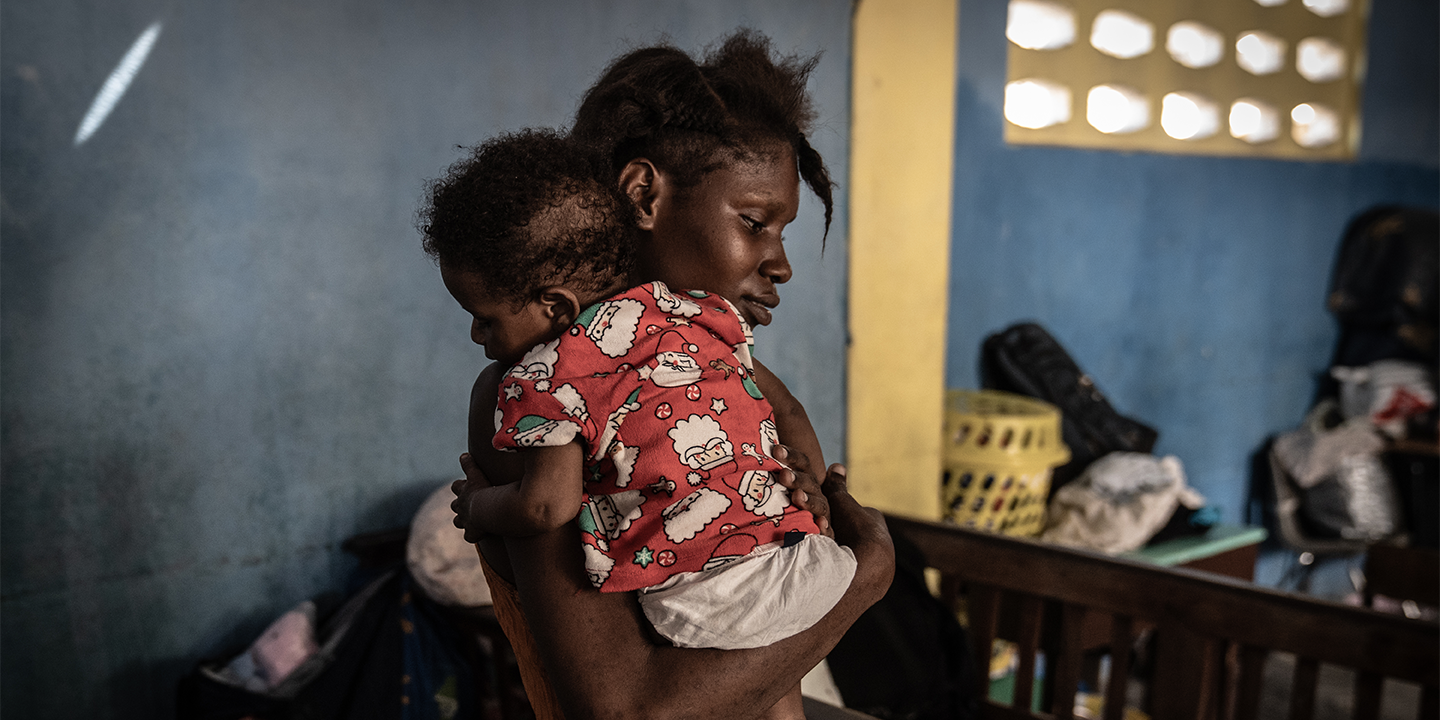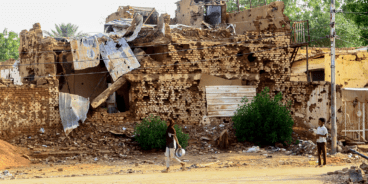

Open Letter to Demand Action for Haiti’s Women and Girls from the New TPC President
To His Excellency Fritz Jean
President of the Presidential Transitional Council
As organizations committed to advancing human rights, justice, and prosperity in Haiti, we take note of your assumption of the Presidency of the Presidential Transitional Council (TPC) on March 7 – one day before International Women’s Day and during Women’s History Month – and write to demand your urgent action to safeguard the rights of Haiti’s women and girls. The transitional government’s record on women’s rights to date falls far short of its legal obligations to Haiti’s women and girls. The consequence of this failure is unaddressed widespread sexual violence, deepening humanitarian harms, exacerbated inequality, and weakened prospects for effective peacebuilding and return to democracy.
We direct your attention to the Policy Framework for an Effective and Equitable Transition that over 180 civil society organizations from Haiti and around the globe have urged the transitional government to adopt in order to better meet its legal obligations to Haiti’s women and girls. We likewise draw your attention to open letters urging responsive action directed to your predecessor, President Voltaire, and Prime Minister Fils-Aimé. We insist that you break with past failures and use your Presidency to take immediate corrective action to ensure that the rights of Haiti’s women and girls are respected and centered in the transitional government’s policies, appointments, and budget.
To date, the transitional government has largely failed Haiti’s women and girls, breaching legal obligations under Haitian and international law and disregarding best practices for successful transitions. Sexual- and other forms of gender-based violence (GBV) are rampant, with reported cases numbering in the thousands. Last year, service providers reported months when rape cases averaged 40 a day, and the United Nations recorded a staggering 1,000% increase in sexual violence cases against children – mostly girls. The government has been largely absent in the face of this crisis, leaving women and girls without protection, GBV-responsive services, or justice. Displacement sites, which have become hotspots for GBV and even sexual exploitation and abuse by those charged with distributing scarce humanitarian resources, are a shameful illustration of what the government’s failure to prioritize women’s needs has wrought to their bodies and lives.
The government’s failure to respond appropriately to the widespread GBV is illustrative of its broader failure to fulfill its clear legal obligations to secure the rights and needs of Haiti’s women and girls. Women and girls continue to face inequality and discrimination across all areas of public and private life, marginalization that exacerbates vulnerability to violence, displacement, poverty, and exploitation. The government has not fulfilled its obligation to address their distinct needs and dismantle the – often deliberately violent – distinct barriers they face. One particularly blatant example is the transitional government’s own violation of the Constitutional obligation to ensure that women are appointed to at least 30% of all public positions. Your own TPC lacks any women with a vote and representation at the ministerial level has actually decreased.
These failures of government policy and prioritization do not simply violate the rights of Haiti’s women and girls and threaten their lives; they also exacerbate Haiti’s crisis and weaken your own transitional government’s efforts to restore peace for all Haitians and set Haiti on a path of democratic stability and prosperity. As the Policy Framework for an Effective and Equitable Transition states, “[c]entering women’s leadership and specific needs is an established best practice for conflict-affected transitions, reflecting the empirical recognition that when women are included, outcomes are more effective and sustainable.” Further, as the February 20 Open Letter explains, because armed groups are using GBV “as a purposeful and insidious tactic for systematically destabilizing communities and wresting territorial control away from the Haitian state,” confronting GBV is “indispensable for stabilizing and rebuilding Haiti and must become a central tenet of your security and accountability policies.”
Centering women’s leadership and specific needs and systematically addressing GBV cannot be neglected afterthoughts. As the UN’s Women, Peace, and Security Agenda establishes, these are imperatives for an effective transition, lasting peace, and stabilized democracy and economy in Haiti.
You have the authority and opportunity to concretely improve the lives of Haiti’s women and girls and to accelerate Haiti’s democratic transition by ensuring women’s participation in decision-making and leadership, adequately responding to the horrific levels of GBV, and otherwise fulfilling your government’s obligations under Haitian and international law. We ask that you make use of both by centering the Policy Framework for an Effective and Equitable Transition in your policies and immediately implementing its recommendations, along with the recommendations provided in the above-referenced open letters. We further draw your attention to equivalent recommendations offered by the UN Office for the High Commissioner for Human Rights.
Respectfully and with great hope that you will take immediate action,
- 100% FANM – SAN POU SAN FANM (Haiti)
- 11th Department (USA)
- Alternative Chance / Chans Alternativ (Haiti)
- American Jewish World Service (AJWS) (USA)
- Anana Consultants (USA)
- Ansara Family Fund (USA)
- Association des Femmes de Borgne (Haiti)
- Bureau des Avocats Internationaux (BAI) (Haiti)
- CAISO: Sex and Gender Justice (Trinidad and Tobago)
- CAR / Chapit Ayiti (Haiti)
- Center for Gender & Refugee Studies (CGRS) (USA)
- Centre de Formation et de Développement Communautaire (CEFODEC) (Haiti)
- Clinique de Recherche, d’Analyse, et d’Assistance Légale de L’École Supérieure Catholique de Droit de Jérémie (CRAALE) (Haiti)
- Coalition des Associations des Femmes pour la Justice Sociale en Haiti (CAFJSH) (Haiti)
- Collectif des Amis des Droits Humains (COLAH) (Haiti)
- Collectif Haïti de France (France)
- Community Coalition for Haiti (CCH) (USA)
- Confédération des Travailleurs et Travailleuses des Secteurs Public et Privé CTSP-HAÏTI (Haiti)
- Congregations of St. Joseph (USA)
- Coordination Europe-Haïti (CoEH) (European Union)
- Diaspora Community Services (DCS) (USA)
- Dominican Sisters of Sparkill (USA)
- Faith in Action International (Haiti)
- Family Action Network Movement (FANM) (USA)
- FAMN RIRAL POU PWOMOSYON DEVLOPMAN AGRIKILTI AN AYITI (FARIPDA) (Haiti)
- Fondation TOYA (Haiti)
- Friends of Matènwa (FoM) (USA)
- Global Centre for the Responsibility to Protect (GCR2P) (USA)
- Gran Jipon (Haiti)
- Groupe d’Action pour le Progrès d’Haïti (GAPH) (Haiti)
- Groupe d’Appui au Développement et à la Démocratie (GRADE) (Haiti)
- Haiti Adolescent Girls Network (HAGN) (Haiti)
- Haiti School Project (USA)
- Haitian American Foundation for Democracy (HAFFD) (USA)
- Haitian Bridge Alliance (HBA) (USA)
- Haitian Women’s Collective (HWC) (Haiti)
- Impact Communautaire pour le Développement d’Haïti (ICODEH HAITI) (Haiti)
- Institute for Justice & Democracy in Haiti (IJDH) (USA)
- International Civil Society Working Group for the Permanent Forum on People of African Descent (ICSWG PFPAD) (Global)
- Komisyon Fanm Viktim pou Viktim (KOFAVIV) (Haiti)
- La Fédération Nationale des Syndicats en Education FENASE (Haiti)
- La Troupe Makandal, Inc. (USA)
- Li, Li, Li! Read (Haiti)
- MADRE (USA)
- Manifest Haiti (USA)
- Massachusetts Action for Justice (USA)
- Nègès Mawon (Haiti)
- New England Human Rights Organisation (NEHRO) (USA)
- Nou Pap Dòmi (Haiti)
- Òganizasyon Feminis Dantò / Dantò Òganizasyon Feminis (Haiti)
- Organisation féministe MARIJÀN (Haiti)
- Organisation FIEF (Haiti)
- Partners in Health (PIH) (Haiti)
- Passionists International (USA)
- PROFAMIL (Haiti)
- Quixote Center (USA)
- Regroupement des Femmes Actives d’Haïti (RFAH) (Haiti)
- Roots of Development (USA)
- Saint Joseph Worker Foundation, Inc. (USA)
- Sant La Haitian Neighborhood Center (USA)
- Summits Education (Haiti)
- UNESCO Inclusive Policy Lab – People of African Descent & SDGs E-Team (Global)
- Unitarian Universalist Service Committee (UUSC) (USA)
- WE ARE WOMEN ORG (Haiti)
- Zantray Fanm Kreyòl (ZAFAK) (Haiti)
Related Content


Atrocity Alert No. 432: Sudan, Venezuela and Haiti
